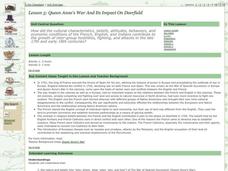Curated OER
Speaking in Grave Tones
Fourth graders examine how a change in attitudes about death took place from the late eighteenth to the early nineteenth century and was embodied in gravestones, literature, and art.
Curated OER
The Cuban Missile Crisis
Students reflect on the events that lead up to the Cuban Missile Crisis in the early 1960s. In this history lesson plan, students explore the conflicts between the United States and the Soviet Union revolving around missiles in Cuba,...
Curated OER
The Homestead Act
Eighth graders analyze the Native American's viewpoint of the Homestead Act. Using one Native American group who lived in Nebraska, they write a letter to the editor of a local newspaper discussing the Homestead Act and how it affected...
Curated OER
U.S. History: The Second Great Migration
Students examine the migration of rural African Americans to northern cities following World War !!. After predicting the effects of cultural and economic factors, they write essays explaining the impact of migration on communities and...
Curated OER
English Perspectives
Students perform research in order to answer an essential question: How did the cultural characteristics, beliefs, attitudes, behaviors, and economic conditions of the French, English, and Indians contribute to the growth of inter-group...
Curated OER
The New Deal
In this 1930s American history worksheet, students study the New Deal as they write 10 vocabulary terms that match 10 definitions, rewrite 4 false statements as true statements, and explain 2 historical themes regarding this time period...
Curated OER
Kwanzaa Memory Book
Students create a Kwanzaa memory book. In this memory book lesson, students cut a cover from a brown paper bag and use ziplock bags as pages. In the ziplock bags they put construction paper with photos and drawings.
Hampton-Brown
From "First Crossing"
Young scholars look closely at four tales taken from the collection of short stories, First Crossing edited by Donald R. Galloby. While examining the life of four teenagers and the lives they lead as U.S. immigrants, your enthusiastic...
Scholastic
The First Thanksgiving Feast
Following an online activity, scholars listen to a read-aloud of If You Were at the First Thanksgiving by Anne Kamma. Pupils discuss their family traditions and complete a T-chart comparing the holiday then and now. Collages are made to...
Curated OER
The Industrial Revolution
Eighth graders examine the time period of the Industrial revolution in American history. In this American History lesson, 8th graders read the chapter on this time period. Students create a presentation on this time period to teach...
Curated OER
First Nation People and European Explorers
Sixth graders investigate the characteristics of explorers. They research the factors that contributed to the first European explorers that came to North America. Students also concentrate on the interactions that explorers had with...
Curated OER
Low-country Rice Planting and Cooking
Eighth graders compare the use of rice in the 1700s to the modern use of rice. In this lesson examining the importance of rice in US history, 8th graders learn about the role of rice in the early 1700s and compare the use of rice in...
Curated OER
Why is the Middle East so Stereotyped in the West?
Students examine the stereotypes used to classify the Middle East. After taking a regional literacy survey, they discover their own global awareness. They discuss how stereotypes are formed and how they persist over time if not stopped.
Curated OER
Charolotte Perkins Gilman's "The Yellow Wall-paper" - the "New Woman"
Students analyze the life of American middle to upper-class women in the mid- to late-nineteenth century and early twentieth century. In this women's suffrage lesson, students visit the given links in the lesson to analyze the changing...
Curated OER
The Automobile
Students are introduced to technological innovations that contributed to mass production of the automobile and how this allows large numbers of Americans to afford an automobile.
Curated OER
Lift and Drag: Principles of Flight and the Soaring Imagination
Students construct models of early gas balloons and gliders. In this balloon and glider lesson, students create models of early gas balloons and gliders, discover how the forces of lift and drag effect aircraft in flight, and put on...
Curated OER
Due Process of Law and the Jim Crow Era
Students analyze eight case studies of Supreme Court decisions regarding due process of law and their impact on American society in the early 20th century. They digest that although the 14th amendment was intended to give federal rights...
Curated OER
A Visual History: Industry, Society, and Social Mobility in Hartford
Eleventh graders examine the industrialization of Hartford. In this American History lesson, 11th graders analyze pictures in Hartford. Students participate in a gallery walk of artifacts.
Curated OER
Dubois and Washington Venn Diagram
Students compare and contrast the visions of W.E.B. Dubois and Booker T. Washington. In this African American history lesson, students read biographies about both men and create a Venn diagram about the men.
Curated OER
Presidents of the United States
Young scholars discuss American Presidents. They each complete research on one particular President and then, using a template, create a short biography (including a picture) about him. When all biographies are complete, they compile...
Curated OER
Tennessee Williams: Wounded Genius
Students explore how Tennessee Williams revolutionized American theater with plays like A Streetcar Named Desire and The Glass Menagerie. But he never escaped the painful legacy of his childhood.
Curated OER
Queen Anne's War and Its Impact on Deerfield
Students researchhow Queen Ann's War of Europe affect Native Americans in New England. After reading excerpts from History of Deerfiel by George Sheldon and Nuthatch's Dilemma, a story about a Pocumtuck woman, students are prepared to...
Curated OER
The History of Rock and Roll: Part 8 - The 70's Have a Nice Day - Lesson 2
Students identify the characteristics and elements of large scale rock productions. They examine the similarities between the American Vaudeville shows and the large-scale rock theater productions of the 1970's.
Curated OER
Clara Barton
Young scholars explore the social change during the nineteenth sand early twentieth centuries. The founding of the American Red Cross by Clara Barton and the role it played in organizing help for those in need is examined in this lesson.

























